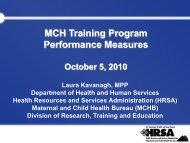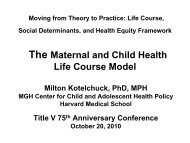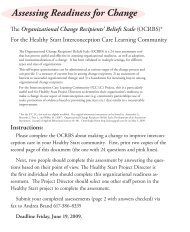IEA Guidelines for proper conduct of epidemiological research - HRSA
IEA Guidelines for proper conduct of epidemiological research - HRSA
IEA Guidelines for proper conduct of epidemiological research - HRSA
Create successful ePaper yourself
Turn your PDF publications into a flip-book with our unique Google optimized e-Paper software.
Good Epidemiological Practice – <strong>IEA</strong> <strong>Guidelines</strong> <strong>for</strong> <strong>proper</strong> <strong>conduct</strong> <strong>of</strong> <strong>epidemiological</strong> <strong>research</strong><br />
GOOD EPIDEMIOLOGICAL PRACTICE<br />
(GEP)<br />
<strong>IEA</strong> GUIDELINES FOR PROPER CONDUCT OF EPIDEMIOLOGICAL<br />
RESEARCH<br />
SUMMARY<br />
In these guidelines, we begin by outlining the background to<br />
<strong>epidemiological</strong> <strong>research</strong> and the role <strong>of</strong> ethics committees.<br />
We then summarise the four general ethical principles <strong>for</strong><br />
<strong>research</strong> and the important concept <strong>of</strong> in<strong>for</strong>med consent. The<br />
second section provides suggested rules <strong>for</strong> good <strong>research</strong><br />
behaviour under the headings <strong>of</strong> working with personal data,<br />
data documentation, publication, and exercise <strong>of</strong> judgment<br />
with a final note on scientific mis<strong>conduct</strong>. It is our intention<br />
that these guidelines will be kept under regular review as new<br />
problems and opportunities emerge.<br />
1
Good Epidemiological Practice – <strong>IEA</strong> <strong>Guidelines</strong> <strong>for</strong> <strong>proper</strong> <strong>conduct</strong> <strong>of</strong> <strong>epidemiological</strong> <strong>research</strong><br />
GOOD EPIDEMIOLOGICAL PRACTICE<br />
(GEP)<br />
<strong>IEA</strong> GUIDELINES FOR PROPER CONDUCT OF EPIDEMIOLOGICAL RESEARCH 1<br />
BACKGROUND<br />
Research should be an activity devoted to the exploration <strong>of</strong> the laws <strong>of</strong> nature driven only by a desire<br />
to know the truth. In the real world, other factors <strong>of</strong>ten interfere with this ideal aspiration and can result<br />
in conflicts <strong>of</strong> interest. Research has to be funded, <strong>conduct</strong>ed and published, and <strong>research</strong>ers like to<br />
promote their reputations. Research is, there<strong>for</strong>e, <strong>of</strong>ten carried out amid many competing elements.<br />
Research findings in public health should serve the public good but may not be welcomed by all.<br />
Findings <strong>of</strong> serious side-effects <strong>of</strong> a given drug, <strong>for</strong> example, may be welcomed by those taking the<br />
drug and their physicians, but may seriously reduce sales and the expected pr<strong>of</strong>its <strong>of</strong> the<br />
manufacturer. Alternatively, a promising hypothesis may not be supported by new data. Opposing<br />
<strong>for</strong>ces may divert the <strong>research</strong>er and may even, in extreme circumstances, lead to a violation <strong>of</strong><br />
ethical codes.<br />
Good Epidemiological Practice (GEP) guidelines recommended by a scientific organisation cannot<br />
prevent these problems but are intended to promote discussion and to in<strong>for</strong>m and educate young<br />
epidemiologists. We need a code <strong>of</strong> practice when we do <strong>research</strong> and when we take part in the<br />
evaluation <strong>of</strong> <strong>research</strong> and <strong>of</strong> each other’s work.<br />
We must also be sure to obtain a reasonable balance between ethical constraints and the opportunities<br />
<strong>for</strong> legitimate <strong>research</strong> <strong>of</strong> importance to public health. The aim <strong>of</strong> this document is to provide a set <strong>of</strong><br />
guidelines, recommended by the <strong>IEA</strong>, <strong>for</strong> the <strong>conduct</strong> <strong>of</strong> high quality <strong>epidemiological</strong> <strong>research</strong> and<br />
<strong>proper</strong> collegiate behaviour. It has no legal status.<br />
<strong>Guidelines</strong> should change with time as new problems and new opportunities emerge and any<br />
document on GEP should thus be regularly re-visited, particularly when it covers <strong>epidemiological</strong><br />
practice in all parts <strong>of</strong> the world.<br />
THE ROLE OF ETHICS COMMITTEES<br />
The <strong>IEA</strong> fully respects the important role <strong>of</strong> ethics committees and all <strong>research</strong> should be based on<br />
accepted ethical standards and be <strong>of</strong> high quality. Poor <strong>research</strong> may do more harm than no <strong>research</strong> at<br />
all. There must, however, be flexibility and an acknowledgement that different types <strong>of</strong> <strong>research</strong> will<br />
require different levels <strong>of</strong> ethical appraisal. One size definitely does not fit all.<br />
1 These updated guidelines are based on a document developed <strong>for</strong> the <strong>IEA</strong>-European Federation by Jørn Olsen, modified<br />
by <strong>IEA</strong> members at the <strong>IEA</strong> Meeting in Brazil in April 2007, and edited by Charles du V Florey, Neil Pearce and<br />
Susie Stewart.<br />
2
Good Epidemiological Practice – <strong>IEA</strong> <strong>Guidelines</strong> <strong>for</strong> <strong>proper</strong> <strong>conduct</strong> <strong>of</strong> <strong>epidemiological</strong> <strong>research</strong><br />
Much <strong>epidemiological</strong> <strong>research</strong> requires simple observation <strong>of</strong> populations and study participants and<br />
does not involve risky or invasive procedures. Such <strong>research</strong> can be threatened by time-consuming,<br />
over-exhaustive and costly ethical appraisal that may only be necessary <strong>for</strong> <strong>research</strong> that involves<br />
invasive and/or risky procedures.<br />
It is our contention that ethical evaluation criteria should be appropriate to the type <strong>of</strong> study under<br />
consideration. Criteria governing randomised clinical trials, which involve invasive interventions,<br />
should not be the same as those applied to simple observational studies where the sole risk to<br />
participants might be that <strong>of</strong> unwanted disclosure <strong>of</strong> personal data. It seems unreasonable to treat all<br />
protocols alike <strong>for</strong> ethical appraisal purposes, regardless <strong>of</strong> risks and benefits.<br />
Experience has also shown that standards vary widely between difference ethical committees and large<br />
multi-centre studies must follow procedures acceptable to all relevant committees. This rigid approach<br />
can threaten the validity and <strong>conduct</strong> <strong>of</strong> a study. We would argue <strong>for</strong> procedures in this area to be<br />
streamlined, especially <strong>for</strong> <strong>research</strong> that covers several geographical regions and, is, there<strong>for</strong>e, subject<br />
to a multiplicity <strong>of</strong> ethics committees. We would further suggest that ethical approval <strong>for</strong> observational<br />
<strong>epidemiological</strong> <strong>research</strong> might be more appropriately addressed by experts in data protection and that<br />
consent to participate in <strong>research</strong> can be given in a broad sense without the need <strong>for</strong> repeated consents<br />
in studies with repeated analyses over time.<br />
It is an un<strong>for</strong>tunate fact that there are rare instances where <strong>research</strong>ers have violated important ethical<br />
standards. This should not, however, result in unduly bureaucratic procedures that absorb unreasonable<br />
amounts <strong>of</strong> time and resources and impoverish <strong>epidemiological</strong> <strong>research</strong> as a whole.<br />
The role <strong>of</strong> ethics committees should be to ensure that high quality <strong>epidemiological</strong> <strong>research</strong> <strong>of</strong> benefit<br />
to the public health can be carried out, after a level <strong>of</strong> scrutiny appropriate to the particular protocol<br />
involved.<br />
ETHICAL PRINCIPLES OF RESEARCH<br />
There are four general ethical principles <strong>for</strong> <strong>research</strong>:<br />
. • Autonomy (Respect <strong>for</strong> individual rights)<br />
. • Beneficence (Do good)<br />
. • Non-maleficence (Do no harm)<br />
. • Justice<br />
Although these principles are well accepted, they must be seen in a broader context. Research is<br />
needed because people have the right to know about hazards to their health and to make evidencebased<br />
choices concerning treatment and prevention. From an ethical point <strong>of</strong> view, it may<br />
sometimes be preferable that no <strong>research</strong> is done, but this is not normally the case. There are many<br />
<strong>epidemiological</strong> <strong>research</strong> projects in which the ethical concerns <strong>of</strong> not doing the study far outweigh<br />
3
Good Epidemiological Practice – <strong>IEA</strong> <strong>Guidelines</strong> <strong>for</strong> <strong>proper</strong> <strong>conduct</strong> <strong>of</strong> <strong>epidemiological</strong> <strong>research</strong><br />
those <strong>of</strong> doing it. Research must also be <strong>of</strong> good quality. Bad <strong>research</strong> may lead to wrong decisions<br />
that may have a pr<strong>of</strong>ound impact on people’s health.<br />
RESPECT FOR INDIVIDUALS<br />
In<strong>for</strong>med Consent<br />
Respect <strong>for</strong> individuals in <strong>research</strong> entails accepting an individual’s right to refuse to participate; to be<br />
in<strong>for</strong>med about the <strong>research</strong> subject; and to be <strong>proper</strong>ly equipped to make a decision based on the best<br />
possible in<strong>for</strong>mation. The principle <strong>of</strong> in<strong>for</strong>med consent rests on the principle <strong>of</strong> autonomy and respect<br />
<strong>for</strong> those who take part in <strong>research</strong>. Written in<strong>for</strong>med consent should be obtained when the <strong>research</strong><br />
involves risks – the purpose should be to in<strong>for</strong>m the study participants, not to protect the <strong>research</strong>er<br />
against possible claims <strong>for</strong> compensation if something goes wrong. Formal written consent is<br />
unnecessary if the <strong>research</strong> is carried out in settings that pose no threat to the potential participants,<br />
when it is stated that taking part is voluntary and it is obvious that no benefits are at risk <strong>of</strong> being lost if<br />
potential participants refuse to take part. Such situations <strong>of</strong>ten arise in studies based on selfadministered<br />
questionnaires or telephone interviews where providing the data involves giving de facto<br />
consent. There may also be instances where in<strong>for</strong>med consent is impossible, difficult, or even unethical<br />
to obtain. There may even be circumstances where requiring specific in<strong>for</strong>mation poses a threat to the<br />
participants and to the validity <strong>of</strong> <strong>research</strong> - <strong>for</strong> example, in the use <strong>of</strong> already existing data.<br />
The early guidelines <strong>of</strong> the Council <strong>for</strong> International Organisations <strong>of</strong> Medical Sciences (CIOMS)<br />
state that:<br />
In<strong>for</strong>med consent is a decision to participate in <strong>research</strong>, taken by a competent individual who<br />
has received the necessary in<strong>for</strong>mation; who has adequately understood the in<strong>for</strong>mation; and<br />
who, after considering the in<strong>for</strong>mation, has arrived at a decision without having been subjected<br />
to coercion, undue influence or inducement, or intimidation.<br />
http://www.cioms.ch/070516april_epi_revisions.pdf<br />
In<strong>for</strong>med consent thus includes three components – in<strong>for</strong>mation, understanding and consent.<br />
In<strong>for</strong>mation<br />
There should be adequate disclosure <strong>of</strong> in<strong>for</strong>mation to enable the potential participant in <strong>research</strong> to<br />
make an in<strong>for</strong>med choice. There may, however, be times when consent has to be given in more general<br />
terms without knowledge <strong>of</strong> the detailed study hypothesis and design. In a case control study, <strong>for</strong><br />
example, disclosure <strong>of</strong> the specific hypothesis may make it impossible to obtain reliable in<strong>for</strong>mation<br />
from participants. Similarly, in much <strong>of</strong> contemporary genetic <strong>research</strong>, the meaning <strong>of</strong> being in<strong>for</strong>med<br />
about the aims <strong>of</strong> the study is not clear since these aims are very broad and change rapidly with new<br />
<strong>research</strong> findings.<br />
4
Good Epidemiological Practice – <strong>IEA</strong> <strong>Guidelines</strong> <strong>for</strong> <strong>proper</strong> <strong>conduct</strong> <strong>of</strong> <strong>epidemiological</strong> <strong>research</strong><br />
Understanding<br />
Individuals should be able to understand what they are told and to make a reasoned choice based on<br />
that in<strong>for</strong>mation. Experience shows that this ideal is difficult to achieve. Too much in<strong>for</strong>mation may be<br />
given in excessive detail, mainly to protect the <strong>research</strong>er and the institution. An understanding <strong>of</strong> the<br />
main ideas and risks <strong>of</strong> the study may be more important than being in<strong>for</strong>med about all the specific<br />
scientific details.<br />
Consent<br />
There should be a voluntary decision or agreement on the part <strong>of</strong> a capable person. Research<br />
participants have the right to refuse to take part in a study but they also have the right to accept. As a<br />
general rule, only <strong>research</strong> ethics committees or similar authorities may deny participants the right to<br />
choose <strong>for</strong> themselves whether they will take part in the <strong>research</strong> or not and they should exercise that<br />
right with great caution. It is especially important that people who may be responsible <strong>for</strong> the potential<br />
harmful exposures under study cannot deny the exposed people the opportunity to have the possible<br />
health effects <strong>of</strong> the exposure studied. If a possible side-effect <strong>of</strong> a new drug is under investigation, <strong>for</strong><br />
example, doctors who have prescribed this drug should provide access to those patients and allow them<br />
to take part in the study if they wish to do so.<br />
Beneficence, non-maleficence and justice may all be involved when considering whether subjects<br />
should be in<strong>for</strong>med about all aspects <strong>of</strong> a study. In general, sufficient in<strong>for</strong>mation must be given so<br />
that, when the interview or examination is completed, or when the <strong>research</strong> results are published,<br />
participants do not feel they have been misled. In<strong>for</strong>mation was insufficient if, at that stage, participants<br />
express regret that they took part and think they would have made a different decision had they been<br />
better in<strong>for</strong>med.<br />
Participants must also have the right to withdraw their consent at any time during the study without<br />
being obliged to give their reasons. Non-participation or withdrawal <strong>of</strong> consent should never result in<br />
disadvantage <strong>for</strong> these individuals. In<strong>for</strong>med consent should be given freely without external pressure<br />
and without unreasonable inducements. There should always be an assessment <strong>of</strong> what incentives, if<br />
any, should be <strong>of</strong>fered to potential respondents <strong>for</strong> participating in the study. Although the distinction is<br />
not clear-cut, a balance between reasonable reimbursements, such as travel costs, and unreasonable<br />
remuneration must be struck. Incentives that include more than payment <strong>for</strong> actual costs are acceptable<br />
only in studies that carry no risk <strong>for</strong> the participants. In the clinical setting, where patients may not feel<br />
free to refuse a request from their doctor to take part in a study, mechanisms to counteract undue<br />
influence must be established. These might include letting an outside person give the in<strong>for</strong>mation or<br />
waiting until patients return to their own environment to ask <strong>for</strong> consent.<br />
Although people have the right to say no, it should be permissible to try to contact people who do not<br />
respond to an invitation to take part.<br />
Consent should not be required <strong>for</strong> use <strong>of</strong> in<strong>for</strong>mation in the public domain, although countries and<br />
communities differ in their definition <strong>of</strong> what type <strong>of</strong> in<strong>for</strong>mation about citizens is regarded as public.<br />
Data gathered <strong>for</strong> administrative purposes do not require consent from the subjects if obtaining consent<br />
could cause undue concerns, be impractical or too expensive. This type <strong>of</strong> <strong>research</strong> requires, however,<br />
5
Good Epidemiological Practice – <strong>IEA</strong> <strong>Guidelines</strong> <strong>for</strong> <strong>proper</strong> <strong>conduct</strong> <strong>of</strong> <strong>epidemiological</strong> <strong>research</strong><br />
that standards <strong>of</strong> data protection are followed to reduce any possible risks <strong>of</strong> disclosure <strong>of</strong> personal<br />
data.<br />
Research ethics committees and other appropriate authorities should specify the conditions <strong>for</strong> setting<br />
up biological <strong>research</strong> banks. If the samples are to be used <strong>for</strong> <strong>research</strong> not covered by the original<br />
consent, an ethics committee should decide under what conditions renewed consent is required.<br />
Research ethics committee or a similar authority could, under special conditions, give consent <strong>for</strong><br />
children and other individuals who are temporarily or permanently unable to give in<strong>for</strong>med consent by<br />
themselves.<br />
It has been suggested that <strong>research</strong> data should be made available to participants but there must be<br />
some caveats to this idea. It could present a threat to data security and would require stringent identity<br />
checks. Furthermore, <strong>research</strong> tests are usually not <strong>of</strong> the same quality as diagnostic tests so providing<br />
uncertain data might do more harm than good. In genetic epidemiology, <strong>for</strong> example, many thousands<br />
<strong>of</strong> gene mutations are <strong>of</strong>ten examined simultaneously without any prior knowledge <strong>of</strong> the role or<br />
importance these genes may have. This makes it impossible to explain the findings in any meaningful<br />
way.<br />
DO GOOD, DO NO HARM<br />
A central aim <strong>of</strong> <strong>epidemiological</strong> <strong>research</strong> is to improve people’s opportunities <strong>for</strong> making choices that<br />
will improve their health. Individuals have the right to choose between different preventive and<br />
therapeutic actions. To do this effectively, they need to know about health hazards related to the<br />
different procedures in order to obtain optimal treatment in the health care system. Without <strong>research</strong><br />
they cannot exercise these rights.<br />
The most basic ethical principle is the moral obligation to cause no harm, whether physical or<br />
psychological, to participants in <strong>epidemiological</strong> <strong>research</strong>. Although the risk <strong>of</strong> harm to those who take<br />
part in an <strong>epidemiological</strong> investigation is usually minimal, most participants gain no personal benefit<br />
and <strong>of</strong>ten do not have a disease that needs treatment. In recognition <strong>of</strong> this altruism, they should be<br />
treated well and with respect. Important findings from the <strong>research</strong> should, there<strong>for</strong>e, be made available<br />
in an understandable <strong>for</strong>m. Results may reveal in<strong>for</strong>mation on individual participants that is <strong>of</strong><br />
importance and value <strong>for</strong> these individuals alone and such data should be made available to them. In<br />
<strong>research</strong> that does not involve risky invasive procedures, the greatest risk to individuals is a disclosure<br />
<strong>of</strong> personal data that could be misused by the media, an employee, an insurance company or someone<br />
else.<br />
6
Good Epidemiological Practice – <strong>IEA</strong> <strong>Guidelines</strong> <strong>for</strong> <strong>proper</strong> <strong>conduct</strong> <strong>of</strong> <strong>epidemiological</strong> <strong>research</strong><br />
RULES FOR GOOD RESEARCH BEHAVIOUR<br />
Data collection and recruitment <strong>of</strong> volunteers <strong>for</strong> <strong>research</strong> in many countries are subject to legal<br />
controls but many other areas <strong>of</strong> activities are not guided by legal principles. In the following section<br />
we present <strong>IEA</strong> guidelines <strong>for</strong> these activities under four headings: working with personal data, data<br />
documentation, publication, exercise <strong>of</strong> judgment. There is also a short section on scientific<br />
mis<strong>conduct</strong>. The list should be regarded as a starting point to which new elements may be added.<br />
WORKING WITH PERSONAL DATA<br />
Working with personal in<strong>for</strong>mation given by participants in <strong>research</strong> is a privilege that should be<br />
respected by making the best possible scientific use <strong>of</strong> the data and by making sure confidentiality is<br />
observed.<br />
Do not work with data that have overt personal identifiers. Such data are only needed during data<br />
collection and as part <strong>of</strong> the data cleaning process. Use a study-specific running number to identify<br />
your data and keep the link between overt personal identifiers (such as names, addresses, phone<br />
numbers, social security numbers) locked in a safe with access limited to the person responsible <strong>for</strong><br />
data security. This person should also make sure that all back-up copies are kept safe. On completion <strong>of</strong><br />
the study, data should be kept in a safe <strong>for</strong> the time period required by law to document published<br />
results. Exchange and sharing <strong>of</strong> data, or reuse <strong>of</strong> existing data, will usually require additional<br />
permissions from the relevant authorities.<br />
Data analyses should be <strong>conduct</strong>ed in designated areas where doors and windows can be locked.<br />
As a <strong>research</strong>er you are bound by pr<strong>of</strong>essional secrecy. You must not reveal personal in<strong>for</strong>mation<br />
obtained by having access to <strong>research</strong> data to anyone outside the scientific <strong>research</strong> team. All<br />
<strong>research</strong>ers on the project should sign a contract <strong>of</strong> pr<strong>of</strong>essional secrecy and should agree in writing to<br />
adhere strictly to the national rules set <strong>for</strong> working with data. The principal investigator is responsible<br />
<strong>for</strong> making sure that all members <strong>of</strong> the team are aware <strong>of</strong> these rules.<br />
Identifiable personal data should never be stored on computers outside <strong>research</strong> establishments and the<br />
files containing personal identifier should be stored in locked cabinets or rooms separated from the data<br />
used <strong>for</strong> analysis. Back-up copies must be subject to the same degree <strong>of</strong> data security and personal data<br />
should only be sent from one place to another by secure methods. Do not send personal data by<br />
ordinary mail or in any electronic <strong>for</strong>m unless they are encrypted. Data should be sent by personal<br />
courier or as special delivery mail.<br />
Those working with data should be identified throughout the study period. They are responsible <strong>for</strong><br />
ensuring that legal conditions are followed correctly and <strong>for</strong> the implementation <strong>of</strong> good practice rules.<br />
Publication <strong>of</strong> data should only be in the <strong>for</strong>m <strong>of</strong> anonymous tables where individuals cannot be<br />
identified.<br />
7
Good Epidemiological Practice – <strong>IEA</strong> <strong>Guidelines</strong> <strong>for</strong> <strong>proper</strong> <strong>conduct</strong> <strong>of</strong> <strong>epidemiological</strong> <strong>research</strong><br />
Epidemiologists <strong>of</strong>ten use personal data, and people’s rights to privacy are paramount and must be<br />
respected. Working with personal data is a privilege that calls <strong>for</strong> a high degree <strong>of</strong> data protection,<br />
especially in situations where data are used without personal consent. Over and above the<br />
requirements set up by the data protection agencies, epidemiologists should set up a working standard<br />
that secures as little risk <strong>of</strong> disclosure <strong>of</strong> personal in<strong>for</strong>mation as possible.<br />
We encourage each country to set up standards <strong>for</strong> data protection <strong>for</strong> all <strong>research</strong> organisations that<br />
have access to personal data, since unintended disclosure <strong>of</strong> personal data can harm individuals.<br />
Public disclosure <strong>of</strong> personal data is a violation <strong>of</strong> the trust that must exist between the<br />
epidemiologists and the people who take part in <strong>research</strong> and a violation <strong>of</strong> this agreement may<br />
impair future options <strong>for</strong> other <strong>research</strong>ers.<br />
Particular care should be taken to avoid publication <strong>of</strong> data that may lead to discrimination against<br />
vulnerable groups in society. Publication <strong>of</strong> unfavourable data from small vulnerable groups may<br />
stigmatise these groups and cause harm.<br />
DATA DOCUMENTATION<br />
Data documentation includes all phases <strong>of</strong> the study, from its planning, through <strong>conduct</strong> to publication.<br />
The <strong>research</strong> protocol is the key document.<br />
The <strong>research</strong> protocol<br />
The protocol is the cornerstone <strong>of</strong> any <strong>epidemiological</strong> <strong>research</strong> project. In this the purpose <strong>of</strong> the<br />
study, the hypotheses, the design, the source population, and the planned analyses are described.<br />
Administrative issues, ethical considerations and possible problems and limitations are also addressed<br />
in the protocol.<br />
The primary objectives <strong>of</strong> the protocol are fourfold:<br />
1 to justify the need <strong>for</strong> the study – that is, why the study should be <strong>conduct</strong>ed, given the current<br />
state <strong>of</strong> knowledge;<br />
2 to demonstrate the appropriateness <strong>of</strong> the proposed methods <strong>for</strong> testing the stated hypothesis;<br />
3 to demonstrate the feasibility <strong>of</strong> doing the study as proposed - that is, that the study can be<br />
completed successfully in the specified time and with the available resources;<br />
4 to demonstrate that the investigator(s) have the ability and skills to <strong>conduct</strong> the proposed study<br />
and are aware <strong>of</strong> all limitations in the design.<br />
8
Good Epidemiological Practice – <strong>IEA</strong> <strong>Guidelines</strong> <strong>for</strong> <strong>proper</strong> <strong>conduct</strong> <strong>of</strong> <strong>epidemiological</strong> <strong>research</strong><br />
The protocol serves:<br />
as an instrument to justify that the project is practicable when applying <strong>for</strong> money or<br />
permissions;<br />
as documentation <strong>for</strong> those <strong>conduct</strong>ing the study - usually a more detailed protocol will be<br />
needed <strong>for</strong> that purpose and this should be updated over the course <strong>of</strong> the study to record all<br />
changes in the original protocol over time.<br />
A study protocol should always be available be<strong>for</strong>e the study starts. Since <strong>epidemiological</strong> studies may<br />
involve many different study designs, it is not possible to present a standard structure <strong>for</strong> a protocol that<br />
could be used in all situations. Nevertheless, the protocol should be sufficiently detailed to serve as<br />
documentation <strong>for</strong> the study. The protocol should demonstrate that the <strong>research</strong>er knows the literature<br />
well. It is <strong>of</strong>ten useful to include power calculations, but in some instances it is acceptable to do studies<br />
with smaller numbers than the power calculations indicate are required. Even a small study may collect<br />
valuable data that may, in combination with other published data, be used to reach conclusions. In any<br />
case, single studies are rarely sufficient to make decisions and consensus is usually reached by<br />
gradually obtaining in<strong>for</strong>mation that modifies previous beliefs until the evidence becomes sufficient.<br />
It is also advisable to include agreements on time schedule, publications and authorship in the protocol.<br />
The protocol is the intellectual <strong>proper</strong>ty <strong>of</strong> the investigators and should be treated as such. It should<br />
be considered as confidential by those who read or review it. It should also be stored and kept after<br />
the study has ended. For randomised studies there are now procedures <strong>for</strong> archiving protocols be<strong>for</strong>e<br />
data collection begins, partly to document that study hypotheses were made be<strong>for</strong>e the data analyses.<br />
Storage <strong>of</strong> data<br />
Once data have been collected, the process <strong>of</strong> data cleaning starts. This process may involve recoding<br />
some data and it is, there<strong>for</strong>e, important that this process is transparent. Data cleaning should involve as<br />
little recoding as possible, the recoding rules should be stated in the protocol, and raw data, without any<br />
manipulations, should always be stored together with the cleaned data.<br />
These data files should then be stored in locked cabinets and kept <strong>for</strong> a time period <strong>of</strong> not less than five<br />
years after the results are published. The data documentation is part <strong>of</strong> this archiving procedure and the<br />
<strong>IEA</strong> supports the establishment <strong>of</strong> public archives <strong>for</strong> <strong>research</strong> data.<br />
Data documentation should be sufficiently detailed to enable others not involved in the study to<br />
replicate its published findings.<br />
PUBLICATION<br />
The general principle is that <strong>research</strong> <strong>of</strong> importance <strong>for</strong> other people’s health should be published,<br />
unless the <strong>research</strong>ers find the study to be <strong>of</strong> insufficient quality. Sometimes a good design described<br />
on paper does not work in practice. If the <strong>research</strong>ers themselves have no confidence in their results,<br />
the results should probably remain unpublished. This should be a rare exception, however, and it is<br />
always unacceptable to avoid publishing results if they do not fit with expectation and hypothesis, or if<br />
9
Good Epidemiological Practice – <strong>IEA</strong> <strong>Guidelines</strong> <strong>for</strong> <strong>proper</strong> <strong>conduct</strong> <strong>of</strong> <strong>epidemiological</strong> <strong>research</strong><br />
they do not fit the financial interests <strong>of</strong> the sponsor. Be<strong>for</strong>e a study starts it should be made clear to all<br />
members <strong>of</strong> the <strong>research</strong> team that the <strong>research</strong> is being done with the aim <strong>of</strong> being published. Many<br />
colleagues have experienced substantial pressure from private funding sources with an economic<br />
interest in certain results when these results were not reached. This had led to a widespread debate<br />
about “conflicts <strong>of</strong> interest”. The <strong>IEA</strong> supports disclosure <strong>of</strong> “conflicts <strong>of</strong> interest”, as well as “conflicts<br />
<strong>of</strong> financial interest.”<br />
Researchers should have no undisclosed conflict <strong>of</strong> interest with their collaborators, editors, sponsors<br />
or participants in <strong>research</strong>. Thus, <strong>research</strong>ers must disclose actual, apparent or potential conflicts <strong>of</strong><br />
interest to the Ethical Review Committee. All sponsorship <strong>of</strong> <strong>research</strong> should be publicly<br />
acknowledged – it is difficult to justify secrecy. All results <strong>of</strong> a study, whether government or industrysponsored,<br />
should be the intellectual <strong>proper</strong>ty <strong>of</strong> the investigators, not the sponsor. Requests to<br />
withhold findings, to change or tone down the content <strong>of</strong> a report to produce a misleading or delayed<br />
publication should be categorically refused.<br />
It is essential to acknowledge these issues at the start <strong>of</strong> negotiations with the sponsor, whether private<br />
or governmental. There should be a written document that states that the results will be submitted <strong>for</strong><br />
publication regardless <strong>of</strong> outcome. The sponsor must acknowledge the independence <strong>of</strong> the<br />
investigators and this relationship must be maintained throughout the study.<br />
The <strong>IEA</strong> recommends that, when <strong>research</strong> <strong>of</strong> public health importance is sponsored by a private<br />
contractor that has a personal interest in a given result, a buffer funding structure should be established.<br />
The buffer could be to act through a government-funded <strong>research</strong> organisation, the purpose <strong>of</strong> which<br />
would be to ensure the data are analysed, interpreted and reported in good faith and that the <strong>research</strong>ers<br />
publish results without pressure to deviate from what the data actually show.<br />
The epidemiologist should not in<strong>for</strong>m the press about the findings <strong>of</strong> a particular study, unless the full<br />
scientific report is available to the public. It is unacceptable to in<strong>for</strong>m the public at a stage when no one<br />
has had the opportunity to read the full report and to challenge the findings. Under normal<br />
circumstances no in<strong>for</strong>mation should be given to the media be<strong>for</strong>e the findings have been subject to<br />
peer review. Only <strong>for</strong> a limited set <strong>of</strong> good reasons (emergency, epidemic, and so on) can this principle<br />
be waived. Investigators, <strong>for</strong> example, may discover health hazards that demand rapid intervention and<br />
thus have an obligation to protect and restore health. In this event, their advocacy must be based on<br />
objective, scientific data only, and these data should be made available <strong>for</strong> others to scrutinise.<br />
National <strong>epidemiological</strong> societies or <strong>IEA</strong> regions could assume responsibility <strong>for</strong> per<strong>for</strong>ming ad hoc<br />
reviews in situations where findings have a public health interest that overrides the principle <strong>of</strong> the<br />
normal review process.<br />
Epidemiologists with access to in<strong>for</strong>mation <strong>of</strong> major public health interest should not delay public<br />
release <strong>of</strong> such in<strong>for</strong>mation, once the evidence has been reviewed by a competent body, usually a<br />
journal with a peer review procedure. Withholding such in<strong>for</strong>mation is a violation <strong>of</strong> the principles <strong>of</strong><br />
non-maleficence and autonomy.<br />
Epidemiologists should not exaggerate their <strong>research</strong> results with the aim <strong>of</strong> increasing the likelihood<br />
<strong>of</strong> obtaining future <strong>research</strong> funding or making their paper more attractive to editors. We also<br />
10
Good Epidemiological Practice – <strong>IEA</strong> <strong>Guidelines</strong> <strong>for</strong> <strong>proper</strong> <strong>conduct</strong> <strong>of</strong> <strong>epidemiological</strong> <strong>research</strong><br />
encourage editors not to highlight key findings in a manner that obscures critical reservation. We<br />
strongly stress the need <strong>for</strong> caution when writing press releases or when communicating directly with<br />
the public. Epidemiologists should be wary <strong>of</strong> publishing poorly supported conclusions. History<br />
shows that many <strong>research</strong> results are wrong or not fully right, and epidemiology is no exception to<br />
this rule.<br />
Published results are usually only a small part <strong>of</strong> the in<strong>for</strong>mation available and it is important that what<br />
is selected is selected in good faith. It is poor scientific practice and misleading to select only what<br />
agrees with the point <strong>of</strong> view <strong>of</strong> the investigator while omitting parts, which contradict previous beliefs.<br />
It is advisable to publish the main results in a <strong>for</strong>m that reaches the participants <strong>of</strong> the study and other<br />
interested members <strong>of</strong> the community where the study took place – <strong>for</strong> example, a newsletter, local<br />
newspapers. As stated, this type <strong>of</strong> publication should await publication in peer reviewed journals.<br />
Raw data should be made available to journal editors if requested and to colleagues who want to verify<br />
already published results. Conditions <strong>for</strong> external access to data must <strong>of</strong> course respect rules <strong>for</strong> data<br />
protection and intellectual <strong>proper</strong>ty <strong>for</strong> those who collected the data, and any other conditions imposed<br />
by the ethics committee that approved the study.<br />
Authorship should follow the Vancouver rules, which state that all authors have taken an active part in<br />
several phases <strong>of</strong> the <strong>research</strong> and are willing to take responsibility <strong>for</strong> the final report.<br />
http://www.icmje.org/<br />
EXERCISE OF JUDGMENT<br />
Conflicts <strong>of</strong> interest can arise when <strong>research</strong>ers have or could have a private or personal interest<br />
sufficient to influence the objective exercise <strong>of</strong> their pr<strong>of</strong>essional judgment towards their <strong>of</strong>ficial<br />
duties. These potential conflicts <strong>of</strong> interest should be taken into consideration when<br />
epidemiologists are asked to provide advice or opinions.<br />
Experienced epidemiologists spend a substantial part <strong>of</strong> their working time evaluating the work <strong>of</strong><br />
others whether <strong>for</strong> editors, funding agencies, or users <strong>of</strong> <strong>epidemiological</strong> studies.<br />
External reviewers <strong>of</strong> <strong>epidemiological</strong> manuscripts and applications <strong>for</strong> funding should recognise that<br />
they play an important role as guardians <strong>of</strong> scientific standards and advisors to journal editors and<br />
funding agencies. Referees judge the originality, scientific reliability, clinical or public health<br />
importance, and overall suitability <strong>of</strong> the paper <strong>for</strong> publication in the journal or <strong>for</strong> the funding<br />
agency. This peer review process is <strong>of</strong> fundamental importance <strong>for</strong> the quality <strong>of</strong> <strong>epidemiological</strong><br />
<strong>research</strong> in general.<br />
Epidemiologists who review <strong>research</strong> protocols, manuscripts in draft or the work <strong>of</strong> colleagues should<br />
ask themselves if they are suitably skilled to per<strong>for</strong>m the review. Reviewers should not accept an<br />
invitation to do peer reviews if they lack competence in the area <strong>of</strong> <strong>research</strong> or have a conflict <strong>of</strong><br />
interest from working too closely with one or more <strong>of</strong> the authors or being a competitor in the field.<br />
Reviewers should respect the intellectual <strong>proper</strong>ty <strong>of</strong> the author's <strong>research</strong> ideas and should not delay<br />
11
Good Epidemiological Practice – <strong>IEA</strong> <strong>Guidelines</strong> <strong>for</strong> <strong>proper</strong> <strong>conduct</strong> <strong>of</strong> <strong>epidemiological</strong> <strong>research</strong><br />
the review process or try to stop a project or a grant <strong>for</strong> personal gain. The review should respect the<br />
intellectual <strong>proper</strong>ty rights <strong>of</strong> those who wrote the paper or the grant proposal.<br />
It is important that we do not pretend to be experts in areas where we are not. One <strong>of</strong> the cornerstones<br />
<strong>of</strong> public and collegiate confidence in <strong>epidemiological</strong> <strong>research</strong> and in epidemiologists is the<br />
assumption that epidemiologists will judge their own work and ideas, and those <strong>of</strong> colleagues,<br />
impartially with skills, knowledge, and in good faith.<br />
Research serves important tasks in a democracy and everybody should be given the opportunity to<br />
contribute with their experience. The <strong>IEA</strong> does not support the view that <strong>epidemiological</strong> <strong>research</strong><br />
should be restricted to people with certain educational backgrounds. Scientific findings should be<br />
reviewed on their own merits. There are general guidelines <strong>for</strong> referees, which have been adopted by<br />
several scientific journals. website link.<br />
SCIENTIFIC MISCONDUCT<br />
Any large-scale study provides ample opportunity <strong>for</strong> manipulation and interpretation <strong>of</strong> data.<br />
Scientific mis<strong>conduct</strong> is any deviation from an interpretation not reached in good faith and with the aim<br />
<strong>of</strong> objectivity. External pressures to publish and to get <strong>research</strong> funding are strong risk factors <strong>for</strong><br />
scientific mis<strong>conduct</strong>, as are editors’ desires <strong>for</strong> simple ‘take home messages’. In spite <strong>of</strong> these risk<br />
factors, the whole specialty relies on scientific integrity, supported by severe sanctions <strong>for</strong> documented<br />
mis<strong>conduct</strong>. We encourage all countries to implement safeguards against mis<strong>conduct</strong> by making<br />
<strong>research</strong> data available <strong>for</strong> other <strong>research</strong>ers and to remind co-authors and supervisors <strong>of</strong> their<br />
responsibility. Recent examples indicate that <strong>epidemiological</strong> <strong>research</strong> is not immune to the most<br />
severe <strong>for</strong>m <strong>of</strong> mis<strong>conduct</strong> - namely, fabrication <strong>of</strong> data. More in<strong>for</strong>mation is available at<br />
www.ieaweb.org .<br />
CONCLUSIONS<br />
Epidemiological <strong>research</strong> is needed in health care, disease prevention and health promotion. This<br />
<strong>research</strong> should be <strong>of</strong> good quality, done in a timely manner and follow recognised ethical standards.<br />
Ethical evaluations should take into consideration the risk <strong>of</strong> not doing as well as the risk <strong>of</strong> doing<br />
<strong>research</strong>.<br />
The <strong>IEA</strong> hopes that these guidelines, which will continue to be kept under review, will provide a useful<br />
template <strong>for</strong> high quality <strong>epidemiological</strong> <strong>research</strong> and <strong>proper</strong> collegiate behaviour.<br />
12



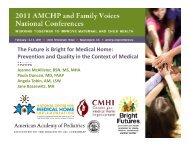
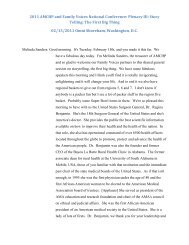
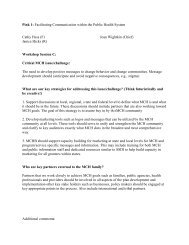

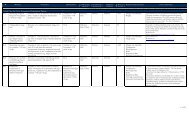
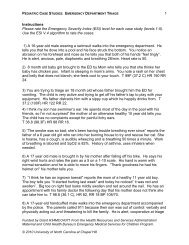
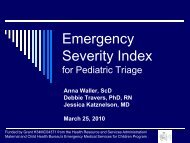
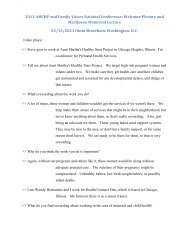
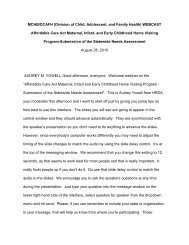
![Hormone Disruptors and Women's Health: Reasons for Concern [PDF]](https://img.yumpu.com/19410002/1/190x245/hormone-disruptors-and-womens-health-reasons-for-concern-pdf.jpg?quality=85)

